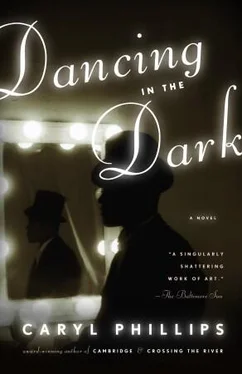For over a year the two boys move together, in and out of the city’s saloons and variety halls, where they learn to obliterate their true selves on a daily basis. Fourteen hours each day in the California fog masquerading as southern “plantation darkies” or northern “zip coons,” rubbing shoulders with Gold Rush dreamers from the Latin, Asian, and European worlds whose own identities appear to breathe free in the misty western air. However, on the Barbary Coast these two boys are expected to perfect clumsy, foolish gestures, and then retire to the wings and silently endure the discourtesy of people mimicking them. Eventually the daily trauma of having to look up to the colored people in the upper balcony and silently beg their forgiveness begins to take a toll on their young spirits. They have both chosen to eschew blackface makeup, which angers most theater owners, but Walker and Williams, with George as the comedian and Bert as the straight man, are now growing weary of trying to be something other than the colored monkeys that the audience in the orchestra stalls assume they are paying to see. For over a year Walker and Williams sing and they dance, and they try not to live down to expectations, and they try not to look up to the upper balcony, and they remain true to their promise that for Walker and Williams, boys onstage dreaming of one day becoming famous men, there will be no blackface makeup.
The Midway Plaisance: I had been told that this place, which was located on Market between Third and Fourth Streets, was formerly known as Jack Cremone’s. It was the first melodeon or variety hall in San Francisco to feature hootchy-kootchy dancers (also known as torso tossers or hip wavers), women who were happy to wind and grind and who, the establishment was pleased to note, did not regard their virtue as their chief asset. For ten cents a white man might enjoy the pleasure of watching female entertainment, and for a little more he might enter one of the booths on the mezzanine floor that were protected with a heavy curtain behind which it was understood private female entertainment might be procured, the nature of which remained your own business as long as the liquor continued to flow. George and myself performed here, long hard days and nights, from 1:30 p.m. to 4 a.m., as Walker and Williams, providing comic relief to men from the redwood forests who had come to the Barbary Coast to spend a half year’s wages on champagne and girls who stuffed banknotes into the lining of their stockings, and who would roll their bellies and bare their bosoms for those rowdy, alcoholprimed men who still had money to spend and who were not yet ready to exchange female pleasures for a good old-fashioned knock-down, drag-out brawl. We performed in this atmosphere with myself as the straight man and George as the comedic banjo picker, each watching the other’s back, quick to spot flying chairs or other missiles, determined to earn enough to eat, learning to understand that at best we would be either tolerated or ignored, until it was no longer possible for us to disregard the barking of the drunken audience, who would eventually cry out and demand that the women return, which was our cue to seek temporary refuge in the wings.
Mid-Winter Exposition, 1894: We were anthropological specimens at Golden Gate Park. When the “real savages” promised at the African Dahomeyan village exhibit were delayed en route to America, Walker and Williams were among those who donned animal skins, and through the long hard winter of 1894, and into 1895, we found ourselves close to Africa. We were instructed to impersonate “natives” steaming with perspiration, and we were obliged to kneel before our masters with the clumsy devotion of camels. I worried about George for, despite the discomfiture of our previous engagement, my partner actually missed the noise and the bustle and the girls of the Midway. The simple truth was, something in his spirit was being corroded by being forced to sit in a pen from sunup to sundown and have people stare and point at him. In fact, it soon became apparent that neither one of us could successfully play primitive , for there was absolutely nothing in our lives that had prepared us for this demeaning role. I watched as poor George sunk further into depression, and although I too was suffering, I chose to dull my pain by studying. At night I consulted John Ogilby’s Africa and other books on the dark continent, and I read about the place from which my “character” was supposed to have originated. This Dahomey was a West African country, slightly smaller than Pennsylvania, whose coastline gave out onto the Atlantic Ocean. I came to understand that this hot country was mostly flat, with some undulating plains and a few scattered hills and low mountains, and it was a poor place where neither Christianity nor the English language had made much impression. Being in possession of these facts helped me to endure the long days of pretense and shame, but sadly George began to retreat further into himself and we spoke less frequently with each other. And then the Dahomeyans appeared, but it was immediately clear that these bewildered Africans were mystified and unable to comprehend what they were doing in this cold, damp place called America, and so the manager of the exposition made the decision to retain his imposters, who the public seemed able to relate to. He dispatched the Africans back to their “jungle,” but George no longer wished to participate and he began to drink excessively, and sometimes he would angrily tear off his animal skin and without warning leave the pen, and I understood that it was time for Walker and Williams to move on and seek fame and fortune elsewhere. As anthropological specimens we had failed.
The two young men share a room down by the water and take turns sleeping on the one narrow bed. Bert lies awkwardly on the floor and looks up at his smaller partner, who pulls deeply on a cigarette and stares at the ceiling. Sometimes George has a detached look about him that suggests he comes from no folks. After all, Bert discovered him on Market Street, just dropped down clear out of the sky. Now life is crushing the pair of them, and they both understand that they need to flee San Francisco, even though this will most likely mean joining a medicine show. George, however, has made it clear to his partner that he is ready to do whatever they have to do, for the city by the bay has nothing more to offer him. In fact, he is desperate enough to consider traveling out to the back of beyond and playing mining towns, places where colored performers generally fear to show themselves, for he understands that unless they act quickly one or both of them are likely to abandon the stage for good. A dejected George lights another cigarette and then returns his gaze to the ceiling, and a worried Bert continues to observe his partner from the vantage point of the floor.
Cripple Creek, Colorado: This small, nondescript town possessed little in the form of government, and the tiny community was under the jurisdiction of El Paso County. In 1890 all of this changed when Gold Fever put Cripple Creek on the map and it rapidly became the fourth-largest gold-producing town in the world. Tent cities sprung up everywhere, and wooden storefronts suddenly lined the dusty streets. The booming town is high in altitude, and none of its forty mines stand below an elevation of nine thousand feet, while some are situated over eleven thousand feet above sea level. This is a tough, volcanic landscape where the dry land is chiseled in rocky ridges and the odd scraggly dwarf tree manages to cling on to a cliff face, but little else flourishes in this first range of the Rockies save mountain grasses, wildflowers, and over five thousand desperate fortune seekers foolhardy enough to have moved eighty-five miles southwest of Denver along wagon-cut roads, and then climbed skyward in the hope of prospecting for new veins by sinking hole after hole into the parched earth. These are crazy times, when a man might arrive on a passenger coach heavy with people, and with nothing to his name but the dusty clothes on his back, and days later the same man might possess the wealth to buy a dozen mansions in any of the fanciest eastern cities. Young Walker and Williams enter Cripple Creek as part of a medicine show, fatigued from days and nights and weeks of rough living, but they still dress well, and they keep their spirits afloat with a high-energy performance that never fails to achieve laughter. But they both know that their chief aim is not to produce laughter but to distract the liquor-filled prospectors so that these desperate and bitter men cannot think clearly about who or what is in front of them. However, here in Cripple Creek, with its newly acquired wealth and its rampant sense of its own importance, the sight of postperformance Walker and Williams in fine clothes causes some prospectors to scratch their heads and think all too clearly about what and who is in front of them and so, at the point of a gun, they strip the fancy clothes from the nigger boys’ backs and force Walker and Williams to wrap themselves in burlap sacks before escorting them to the edge of the town. At ten thousand feet, and bereft of jacket, shirt, pants, and shoes, the young performers walk barefoot out of Cripple Creek with laughter ringing in their ears. They understood that going back to the medicine show circuit was always going to be a delicate business, but here in Cripple Creek, Colorado, the two young men finally discover the true extent of the danger and they decide, No more.
Читать дальше












